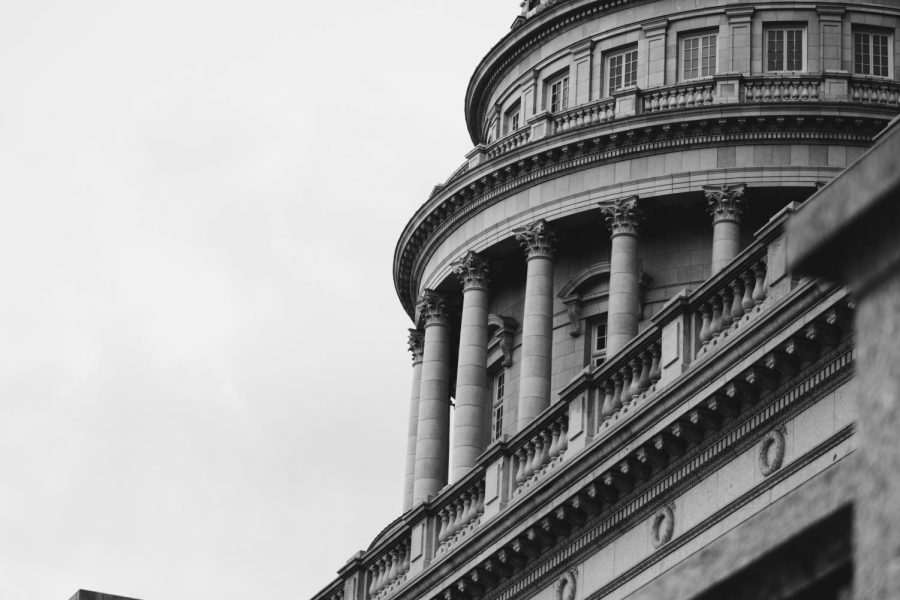Lien: Utah May Be the Next State to Ban Drag
The Utah State Capitol Rotunda on Friday, Feb. 12, 2020. (Photo by Mark Draper | Daily Utah Chronicle)
March 17, 2023
Tennessee’s governor signed S.B. 3 into law on March 2, banning “adult cabaret performance” — drag shows — on public property or in view of minors. It also bans these performances from happening within 1,000 feet of a school, public park or place of worship. Those found violating the law face misdemeanor charges on the first offense, punishable by a fine up to $2,500 and/or a year in jail. Those found guilty of further violations can face felony charges and up to six years in jail.
S.B. 3 unconstitutionally attacks freedom of expression and queer community-building, and will likely lead to similar bills proposed in Utah.
The Tennessee House also passed H.B. 30, a bill that requires drag artists to obtain permits before performing, and H.B. 878, allowing government employees to refuse to marry any couple based on religious beliefs. These bills head to the Senate for consideration and are expected to pass.
S.B. 3’s language is confusing and vague. It doesn’t offer any examples or clear guidelines of what grounds for arrest can be. The law criminalizes “topless dancers, go-go dancers, exotic dancers, strippers, male or female impersonators who provide entertainment that appeals to a prurient interest, or similar entertainers.” How exactly do we quantify what is of a prurient interest? It’s incredibly subjective. To add to that, there are no specifics on what drag looks like on a person. Tennessee could very well criminalize being trans, or simply looking different from the standard. Women with short hair and men with long hair, it’s time to do something about that.
Legally, this bill violates the First Amendment. Because this law is limited to performances that are “harmful to minors,” theoretically most shows won’t be affected. However, various Tennessean legislators fought to prevent even family-friendly shows, with no lewd or sexual content, from being held in public. It’s not a stretch to suspect that officials may hope to interpret the law broadly.
And even if interpreted narrowly, S.B. 3 violates the Constitution. The First Amendment protects more than written, oral and signed speech. It protects actions deemed as expressive conduct, regardless of who might be in the audience.
As far as the bill’s reach, it affects more than just performers who will lose their livelihoods. Drag story hours in libraries may cease to exist. No more drag brunches or benefit events. No more performances happening in hospitals or at Pride. Kiss safe spaces for queer community goodbye.
Since 2015, Tennessee has unleashed a slew of anti-queer bills — S.B. 3 is simply one among many. Along with this bill, the state has enacted a ban for age-appropriate, best practice gender-affirming care for trans youth. In the past, Tennessee imposed three laws preventing trans kids from playing in sports aligning with their gender, curriculum censorship bills, two bathroom bans and a law allowing discrimination by state contracts providing child welfare services, among other transphobic policies.
Utah, unfortunately, wants to follow in the footsteps of the Volunteer State. Despite the failure of Utah’s own “Don’t Say Gay” bill to pass this session, make no mistake: the advance of our anti-trans legislation dangerously erodes LGBTQ rights. Tennessee will become a source of inspiration for next year’s lawmakers, who are going to simply copy and paste this round of heinousness.
While no anti-drag bills are on the horizon in Utah, attacks against queer people and the freedom of expression plague our politics. In June, there was a drag show in St. George’s Town Square Park titled “We’re Here” aimed at visiting smaller, conservative cities to facilitate discussions between queer communities and other residents. The show was meant to foster community — yet an alarming number of people took offense to it. City Manager Adam Lenhard was criticized so much for not shutting the event down, he ended up resigning. Those opposing the show cite morality and not wanting their children groomed “for satanic purposes.”
Dixie State, renamed Utah Tech University, hosted a drag show sponsored by the LGBT Student Association. It was blasted online by St. George councilwoman Michelle Tanner, who stated that “this community deserves better than ‘Woke University.’” UT English professor Alexis Ence added to the flames, saying she believes that drag shows discriminate against women and believes the school has too much liberal indoctrination.
Giving people and students the opportunity to express themselves is not “woke.”
This rhetoric is incredibly common for attacking drag shows and queer people. The resounding sentiments are that freedom of expression is immoral and we must protect children at all costs. Since when have politicians genuinely cared about children?
I won’t argue that children should attend 18+ events. But people merely existing in drag is not a crime. Parents can choose where to take their child, and if it happens to be a burlesque drag show, that’s not on the performers.
At its heart, S.B. 3 isn’t about protecting children. It’s about regulating how people express themselves in public and attempts to scare the queer community back into their closets. Look out, gender non-conforming folks, your mere presentation is illegal. We’re going to start labeling people criminals and felons and letting legislators walk free.
S.B. 3 and others like it are stepping stones to rescinding more and more rights of queer people.









John Doe • Mar 22, 2023 at 7:55 pm
It’s hilarious to me that drag as existed in human history for centuries if not millennia and it’s only NOW that people have their undergarments in a twist about it. It’s always about trying to go after one group or another in a never ending witch hunt. And considering how Utah is so eager to teach how their pioneers settled in the state because of persecution it’s so shameful that they also jump at the chance to go after anyone labeled “different”.
I wonder if dressing up for Halloween is going to be next on the chopping block. Or is a spooky holiday about frightening things not “satanic” enough while people dressing in clothes and performing is? Perhaps Utah’s theaters should be next then? You never know!